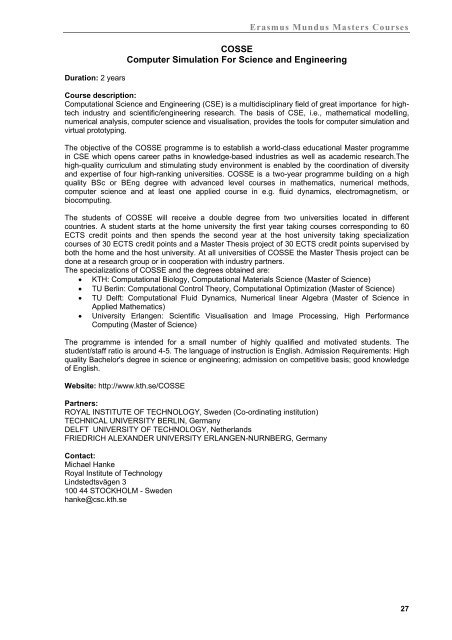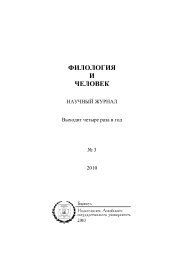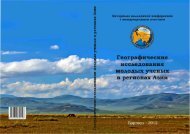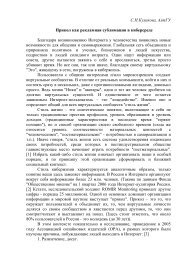Erasmus Mundus Action 1 Compendium 2009 - EACEA - Europa
Erasmus Mundus Action 1 Compendium 2009 - EACEA - Europa
Erasmus Mundus Action 1 Compendium 2009 - EACEA - Europa
You also want an ePaper? Increase the reach of your titles
YUMPU automatically turns print PDFs into web optimized ePapers that Google loves.
Duration: 2 years<br />
<strong>Erasmus</strong> <strong>Mundus</strong> Masters Courses<br />
COSSE<br />
Computer Simulation For Science and Engineering<br />
Course description:<br />
Computational Science and Engineering (CSE) is a multidisciplinary field of great importance for hightech<br />
industry and scientific/engineering research. The basis of CSE, i.e., mathematical modelling,<br />
numerical analysis, computer science and visualisation, provides the tools for computer simulation and<br />
virtual prototyping.<br />
The objective of the COSSE programme is to establish a world-class educational Master programme<br />
in CSE which opens career paths in knowledge-based industries as well as academic research.The<br />
high-quality curriculum and stimulating study environment is enabled by the coordination of diversity<br />
and expertise of four high-ranking universities. COSSE is a two-year programme building on a high<br />
quality BSc or BEng degree with advanced level courses in mathematics, numerical methods,<br />
computer science and at least one applied course in e.g. fluid dynamics, electromagnetism, or<br />
biocomputing.<br />
The students of COSSE will receive a double degree from two universities located in different<br />
countries. A student starts at the home university the first year taking courses corresponding to 60<br />
ECTS credit points and then spends the second year at the host university taking specialization<br />
courses of 30 ECTS credit points and a Master Thesis project of 30 ECTS credit points supervised by<br />
both the home and the host university. At all universities of COSSE the Master Thesis project can be<br />
done at a research group or in cooperation with industry partners.<br />
The specializations of COSSE and the degrees obtained are:<br />
• KTH: Computational Biology, Computational Materials Science (Master of Science)<br />
• TU Berlin: Computational Control Theory, Computational Optimization (Master of Science)<br />
• TU Delft: Computational Fluid Dynamics, Numerical linear Algebra (Master of Science in<br />
Applied Mathematics)<br />
• University Erlangen: Scientific Visualisation and Image Processing, High Performance<br />
Computing (Master of Science)<br />
The programme is intended for a small number of highly qualified and motivated students. The<br />
student/staff ratio is around 4-5. The language of instruction is English. Admission Requirements: High<br />
quality Bachelor's degree in science or engineering; admission on competitive basis; good knowledge<br />
of English.<br />
Website: http://www.kth.se/COSSE<br />
Partners:<br />
ROYAL INSTITUTE OF TECHNOLOGY, Sweden (Co-ordinating institution)<br />
TECHNICAL UNIVERSITY BERLIN, Germany<br />
DELFT UNIVERSITY OF TECHNOLOGY, Netherlands<br />
FRIEDRICH ALEXANDER UNIVERSITY ERLANGEN-NURNBERG, Germany<br />
Contact:<br />
Michael Hanke<br />
Royal Institute of Technology<br />
Lindstedtsvägen 3<br />
100 44 STOCKHOLM - Sweden<br />
hanke@csc.kth.se<br />
27






